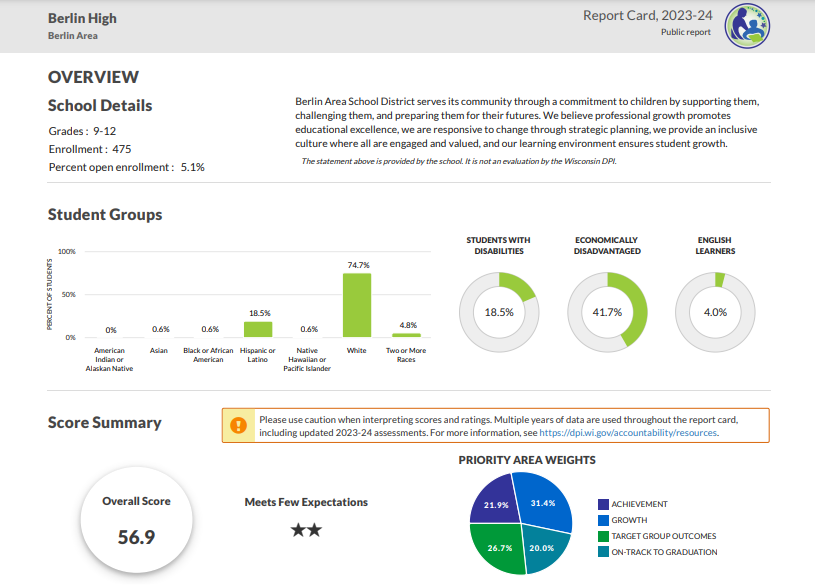The Berlin High School received a score of 56.9 from the Wisconsin Department of Public Instruction, which falls under the category of “Meets Few Expectations.” The BASD received a score of 55.4, which is the same category.
“I guess I want to say right up front that I don’t think any one score in one test or any one report card really encapsulates all the things about our district,” Superintendent Dr. Emmet Durtschi said.
The report is for the 2023-2024 school year and is based on multiple things including the Forward exam, the Pre-ACT, and the ACT. In both the math and English departments, which got scores of 45.6 and 54.9 respectively, there are plans to help increase their scores.
“I know one of the things that helps with our achievement score is the ACT and what we want to do is start implementing at the lower levels practice ACT problems so that as freshmen, they start seeing the format of the questions,” math teacher Shawn Erb said.
The English department is also looking to improve their scores and looked to the report card for where improvement was needed.
“We’ve got to focus more on building English skills, and I think a lot of that comes from implementing more independent reading and more writing in response to that,” English teacher Angela Femali said. “But, I also don’t put a whole lot of store into scores like that because they don’t reflect the whole picture.”
Another main focus of the report card was the school’s target group. The target group is automatically the lowest scoring 25% of students in the school.
“We can learn who those students are, so we can dive into the data and actually determine, ‘oh these are the students that were struggling the most on that assessment,’” Durtschi said. “We can do our own data analysis and work to make sure that we’re seeing what we can do extra to help support them.”
Attendance is also a factor of the report card, and the high school is below the state in that regard.
“Attendance rates in the state and across the country for students have really plummeted during COVID and we’re still working at getting those back,” Durtschi said. “That affects us, it affects everybody, because clearly if you’re not here it’s hard to learn.”
Durtschi says a main factor in improving the district’s score is raising expectations across the board.
“My experience is that I don’t believe all students are setting their personal expectations as high as they should, I don’t think all teachers are setting those expectations high enough for all kids, and I don’t believe all parents are doing that,” Durtschi said. “I think it’s all of us working together thinking about those learning expectations.”
The tests that the school is scored on are considered high stakes tests that students typically study for. However, if their personal expectations are low, they may not study at all and score much lower than they otherwise would.
“I want students and parents to know that this isn’t acceptable, we need to do better, and it’s not something that just happened overnight,” Durtschi said. “But also that the only solution to improving the outcome for all of our students is for all of us to work together.”
While some might worry much about these scores, many agree that they’re not the be-all-end-all of the school.
“I don’t always think those are the most accurate,” Erb said. “I don’t think that our achievement score is actually a reflection of how well our students in Berlin understand math.”
However, that is not to say the scores have to be the only thing to consider in a school’s success.
“I think our department and our students are doing a good job, but that testing doesn’t give us a full picture of that. So I kind of have mixed feelings,” Femali said. “I want the public to know that we’re doing good things and our kids are doing good things. When this is the reflection of it, it disappoints me.”













